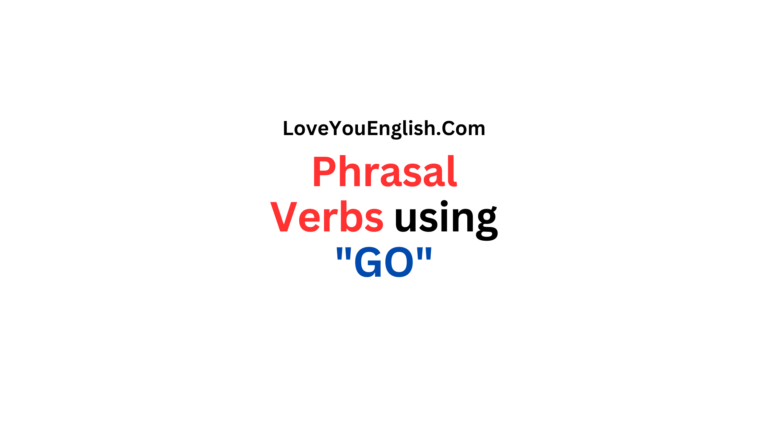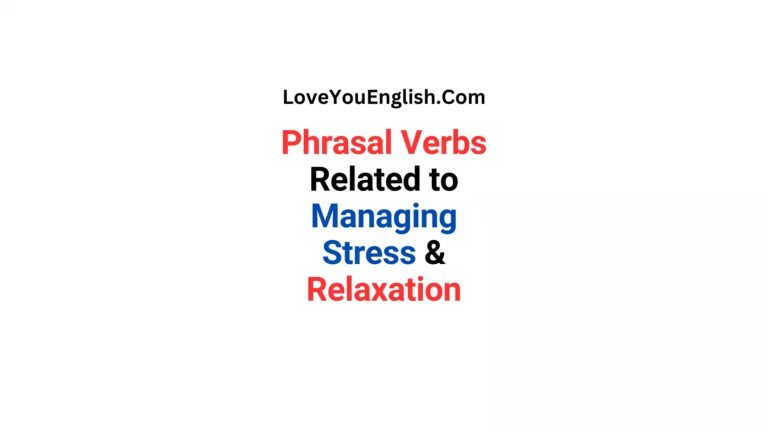Phrasal Verbs to Use When Making Plans
Sharing is caring!
Making plans is an important part of everyday life. Whether you’re planning a weekend with friends or scheduling a work meeting, being able to express your plans clearly is essential.
In English, we often use phrasal verbs when talking about plans. Phrasal verbs are two or more words (a verb + a preposition or adverb) that work together to create a new meaning.
In this post, I’ll teach you some common phrasal verbs that are perfect for making plans.
What Are Phrasal Verbs?
Before we dive into the specific phrasal verbs, let’s quickly define what they are. A phrasal verb is made up of a verb and one or two other words (prepositions or adverbs) that change the meaning of the original verb. For example, the verb “look” can change its meaning when combined with different prepositions like “after,” “for,” or “forward.”
For example:
- Look after = Take care of.
- Look for = Search.
- Look forward to = Be excited about something in the future.
Now that we know what phrasal verbs are, let’s see how they can be used in making plans!
1. Set up
When you “set up” something, it means to arrange or organize it, especially in advance. You can use “set up” when you’re planning an event, meeting, or even a casual get-together.
Examples:
Tip: “Set up” is commonly used for arranging events or activities that require preparation.
2. Pick out
When you “pick out” something, it means to choose or select something from a group. It’s a great phrasal verb to use when making decisions about what to do or where to go.
Examples:
- “I need to pick out a restaurant for our dinner tomorrow.”
- “Can you pick out a movie for us to watch?”
Tip: Use “pick out” when you’re making decisions on specific items or plans from a list or group.
3. Call off
If something is “called off,” it means that it has been canceled. This phrasal verb is useful when talking about plans that have been canceled or postponed.
Examples:
- “We had to call off our picnic because of the rain.”
- “The meeting was called off due to a scheduling conflict.”
Tip: Use “call off” to talk about plans or events that you no longer want to do.
4. Follow through
To “follow through” means to complete a plan or promise, especially after making initial preparations. This phrasal verb is useful when you want to express that you will finish or carry out your plans.
Examples:
- “I will follow through with the plans for our team lunch.”
- “You need to follow through with your commitments if you want to succeed.”
Tip: This is a great phrasal verb for showing that you are committed to completing something you started.
5. Catch up
“Catch up” means to meet with someone and talk about what has been happening in your lives since the last time you spoke. It’s often used when making plans to reconnect with friends or colleagues.
Examples:
- “Let’s catch up next weekend over coffee.”
- “We should catch up soon; I’ve missed talking to you.”
Tip: “Catch up” is perfect for informal plans, especially with friends or family.
6. Come up with
When you “come up with” a plan, you create or think of an idea. This phrasal verb is used when you are brainstorming or planning something new.
Examples:
- “Let’s come up with a new idea for the project.”
- “I need to come up with a plan for our weekend trip.”
Tip: Use “come up with” when you’re in the process of creating or thinking of ideas.
7. Take up
If you “take up” something, it means to begin a new activity or hobby, or accept an invitation or challenge. It’s great for plans that involve starting something new.
Examples:
- “I decided to take up swimming as part of my fitness plan.”
- “I’m thinking of taking up cooking classes this year.”
Tip: Use “take up” when you’re starting something new or accepting an invitation.
8. Look forward to
“Look forward to” means to be excited about something in the future. This is one of the most common phrasal verbs used when discussing plans, especially when you’re excited about something.
Examples:
- “I really look forward to our trip to the beach next month.”
- “I’m looking forward to meeting you tomorrow.”
Tip: Use “look forward to” to express excitement and anticipation for something that is going to happen.
9. Write down
When you “write down” something, it means to note or record information, like making a list of plans or details. This phrasal verb is useful when you want to make sure you don’t forget something important.
Examples:
- “I’ll write down the details of our meeting so I don’t forget.”
- “Can you write down the date for our event?”
Tip: Use “write down” when you want to make sure you have a record of something important.
10. Drop by
To “drop by” means to visit someone briefly, without making a formal appointment. It’s a casual way to make plans to see someone.
Examples:
Tip: Use “drop by” for informal visits that don’t need much planning.
11. Check in
“Check in” means to get in touch or confirm something, especially to make sure that things are going as planned. This phrasal verb is used when you want to follow up on something.
Examples:
- “I’ll check in with you tomorrow to see how the meeting went.”
- “Don’t forget to check in with the team before the presentation.”
Tip: Use “check in” when you want to follow up or confirm plans.
12. Run into
“Run into” means to unexpectedly meet someone while you’re out and about. It’s often used when plans are changed due to surprise encounters.
Examples:
- “I didn’t expect to run into Jane at the cafe!”
- “I ran into Mark at the store, and now we’re planning to catch up.”
Tip: “Run into” is for surprise meetings, often unplanned but pleasant.
Conclusion
Using phrasal verbs can make your English sound more natural and fluent when talking about your plans. These versatile phrases help you express a wide range of ideas, from making arrangements to canceling events or even reconnecting with people.
By practicing these phrasal verbs, you’ll be able to communicate your plans more clearly and confidently in everyday conversations.
Next time you’re making plans, try using some of these phrasal verbs to sound more like a native speaker.
Happy planning!
Read more:
- Phrasal Verbs with “CALL,” along with their meanings
- 40 English Phrasal Verbs with Meanings
- Phrasal Verbs with “GET,” along with their meanings
- Phrasal verbs with ‘bring’ with examples
- Phrasal Verbs: Common Examples & Their Meanings
- Phrasal Verbs — The Complete Guide
- 30 Most Common English Phrasal Verbs with Meanings
- Phrasal Verbs and Their Usage: A Guide About Phrasal Verbs
Sharing is caring!








